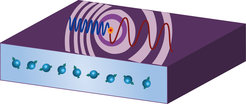A speed limit for spins
Magnets form key components in every computer for information storage. The spins of their electrons, much like tiny compass needles, all point in one direction and sustain wave-like excitations – the so-called magnons. Magnons move through high-quality electrical insulators almost without resistance or the heating that comes with charge currents. Large‘magnon currents’ are an efficient way to carry information, a key pursuit in spintronics, which makes spin-based technologies highly attractive for low-power information and communication technologies.

However, when a large number of magnons moves in the same direction, they mutually disturb each other and their flow becomes viscous, like honey. Their viscosity grows with the strength of the spin current, making it increasingly difficult for the magnons to move. This begs the question: Can a large spin current even exist and flow smoothly in a magnet when magnons interact strongly with each other?
Now a theory team led by the MPSD has revealed a fundamental speed limit to spin currents in magnetic insulators and identified a close similarity to charge currents in superconductors, The underlying reason for this speed limit lies in the so-called Doppler effect, which causes the spin current to break down once it moves too strong – just like an ambulance siren sounds different once it passes us. The Doppler effect describes the change in wave frequency depending on the relative motion between two objects. This effect is known in superconductors which become unstable once the electron current becomes too large, but now the researchers have discovered an analogous effect in magnetic insulators, highlighting the role of magnon viscosity in spin transport.
When a magnetic thin film is stimulated by stripline microwaves, a spin current (magnon) that flows only in one direction is excited — but this can only happen up to a certain level before the chiral spin pumping effect breaks down. Using advanced theoretical concepts and extensive numerical simulations, the team demonstrated that the magnon frequency is modulated by spin currents that drag the magnons. The frequency of magnons is simply not allowed to become negative, which in turn limits the maximum spin current that a magnetic material can sustain.
"The predicted Doppler effect in magnetic films is an unexpected consequence of the increased viscosity of the confined magnon gas that awaits experimental observation,” says Prof. Gerrit Bauer from Tohoku University. “We were surprised to find this analogy between magnetic insulators and superconductors“, adds Tao Yu, first author and postdoc at MPSD. „Despite their similarities, these systems differ on a fundamental level. Unlike charges, the magnons are not conserved and behave in a more complicated way. It is exciting to see the universality of physical laws emerge in very different systems."
The researchers also expect that their theory can be extended to other magnetic phenomena and systems, such as magnetization textures or anti-ferromagnets, where the spin viscosity is much less investigated. "We are only beginning to understand the effects of spin viscosity," explains Michael Sentef, group leader at MPSD. "There are already demonstrations of magnon instabilities based on increasing magnon numbers in magnets, but the instability by spin drag is a different scenario.” Chen Wang, professor at Tianjin University, predicts: "The change of magnon velocity by the Doppler effect depends on the flow direction of the magnon, and thus behaves like a diode for the spins that might be useful for logic devices in the future."












